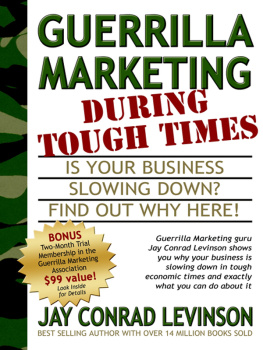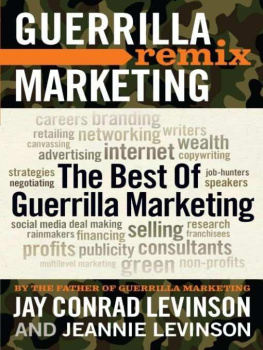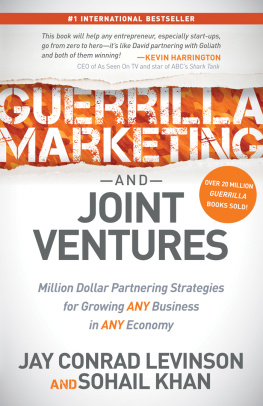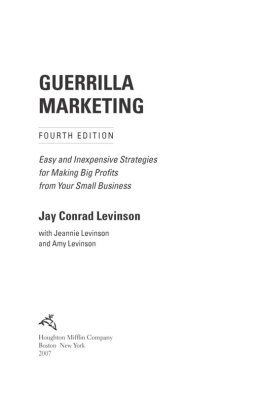A complete reworking of Jay Conrad Levinson's guerrilla manifesto. Learn to think and market like a guerrilla and crush your competitors.
Jay Conrad Levinson takes the proven concepts of the world's most successful companies, and synthesized them into a new type of marketing that any business can use to make mega-profits. This is Barely LegalBut You Can Still Get Away With It!
60 Profitable Tips in 60 Enlightening Minutes. Jay Conrad Levinson and David Garfinkel join forces to give small business owners, executives and marketing professionals 60 essential tactics, strategies and concepts for producing highly effective marketing messages.
Find Out Why Your Business Is Slowing Down. Jay Conrad Levinson shows you exactly why your business is slowing down in tough economic times and exactly what you can do about it.
This 4-Volume set contains over 5 hours of business-building secrets personally presented by Jay Conrad Levinson, Father of the Worldwide Guerrilla Marketing Revolution.
Over 4 hours of Bootlegged, CD Quality Audio, from the GM 101 Set. Never before revealed tactics and insights from the Father of Guerrilla Marketing.
CHAPTER 1
TOUGH TIMES DON'T
HAVE TO BE AS TOUGH
AS YOU THINK
I n every down economy some businesses lose money while others seemingly coin money. This course is designed to put you into the latter category. The plain fact is that guerrillas have an advantage during tough times. They are able to work in relatively shorter time frames. Their penchant for information enables them to market more quickly and creatively to market needs.
The guerrilla lives by different rules during tough times than during boom times. The guerrilla attacks when the competition retreats and the attack is concentrated where the guerrilla offers specific product or service advantages. Retreating companies leave voids in the market, ideal niches for guerrilla companies.
Guerrillas do not commit all their resources to any one front because they try to maintain resources for new options and for potential confrontations with the competition. Flexibility is an asset. Successful guerrilla companies try to be inconspicuous about their success, reducing the chances of being copied when attacked by their competitors.
They know many companies have scrubbed or reduced their marketing budgets to combat tough times and that it will cost those firms three dollars for every dollar formerly spent to reach the same level of consumer recognition and share of mind they previously enjoyed.
Guerrillas are aware that their prospects are more likely to recall marketing messages delivered consistently during a fragile economy even if they are smaller and less frequently delivered. So they maintain the attitude of a guerrilla even when the economic situation is in its darkest days.
"In a dog-eat-dog economy the Doberman is boss, said Edward Abbey, the author and naturalist. In this regard, the Doberman and the guerrilla have a lot in common.
Guerrillas know that they must seek profits from their current customers . They worship at the shrine of customer follow-up. They are world-class experts at getting their customers to expand the size of their purchase. Because the cost of selling to a brand-new customer is six times higher than selling to an existing customer, guerrilla marketers turn their gaze from strangers to friends.
This reduces the cost of marketing while reinforcing the customer relationship. To guerrillas, follow-up means marketing to some of the most cherished citizens of planet Earth their customers.
When your customers are confronted with their daily blizzard of junk mail and unwanted email, your mailing piece won't be scrapped with the others, and your email won't be instantly deleted. After all, these folks know you. They identify with you. They trust you. They know you stay in touch with them for a reason. So they'll be delighted to purchase or at least check out that new product or service they didn't know you offered. They'll always be inclined to buy from a company they've patronized instead of experimenting with a company that has not yet won a share of their mind.
When you follow up with intensity it proves that you really care and that you'll be there when the customer truly needs you. If you haven't started a customer-stroking program yet, start it tomorrow. And whatever you do, put it in writing and determine two things: who will take the responsibility for each follow-up activity, and when that activity will take place.
In any rugged economy, the telephone is a remarkably effective follow-up weapon for guerrillas. You certainly don't have to use the phone to follow up all of your mailings to customers, but research proves that it always will boost your sales and profits. Sure, telephone follow-up is a tough task. But it works. Anyhow, no one ever said that guerrilla marketing is a piece of cake.
Email ranks up there with the telephone, possibly even outranks it. It's inexpensive. It's fast. It lets you prove you care. It helps strengthen your relationship. And in your subject line, you can mention the recession if your offering is in any way related to it.
Lean upon your website as well. Instead of telling your whole story with other marketing, use that other marketing to direct people to your site. Then, use the site to give a lot of information and advance the sale to consummation.
Guerrillas are able to think of additional products and services that can establish new sources of profits to them. In any kind of economy they are on the alert for strategic alliances fusion marketing efforts with others. This kind of cooperative marketing makes sense at all times, but makes the most sense during tough times, when companies must market aggressively while reducing their marketing investment.
Guerrilla companies cease most broadcasting and increase their narrowcasting to customers and carefully targeted prospect lists. A faltering economy is tough. Still, when the going gets tough, guerrillas make sizeable bank deposits. Many see beauty in economic ugliness.
In gloomy economic days, when everything else seems to be shrinking, think in terms of expanding your offerings. Do absolutely everything you can to motivate customers to expand the size of their purchase. Prove that buying right now is a sagacious move because of the tough times.
In marketing to customers and to non-customers, show that you are fully aware of the economic situation and that you have priced your goods and services accordingly. Even though your marketing is always truthful, exert even more of an effort during bad times to make it sound truthful. Candid language is a powerful weapon. Admit that times are tough; admit that people must be extra careful when buying things; explain that you're fully aware of the economy and taken special steps because of it.











